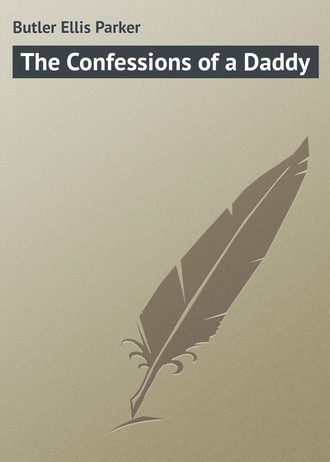 полная версия
полная версияThe Confessions of a Daddy

Ellis Parker Butler
The Confessions of a Daddy
I. OUR NEIGHBORS’ BABIES
I guess we folks that live up at our end of town think we are about as good as anybody in Colorado, and mebby a little better. We get along together as pleasant as you please, and we are a sort of colony, as you might say, all by ourselves.
Me and Marthy make especial good neighbors. We don’t have no fights with the other folks in our end of town, and in them days the neighbors hadn’t any reason to fight with us, for we didn’t keep a dog and we hadn’t no children! I take notice that it is other folks dogs and children that make most of the bad feelin’s between neighbors. Of course we had mosquitos, but Providence gives everybody something to practise up their patience, and when me and Marthy sat out on our porch and heard other people’s children frettin’ because the mosquitos was bad, we just sat there behind our screened porch and thanked our stars that we did n’t have no children to leave our screen doors open.
It was n’t but right that me and Marthy should act accordingly. I don’t mean that we were uppish about it, but we did feel that we could live a little better than our neighbors that had all the expense of children, and if our house was fixed up a little better, and we was able to go off three or four weeks in the summer to the mountains, when all the rest stayed right at home, we had a right to feel pleased about it. Lots of times we had things our neighbors could n’t afford, and then the little woman would say to me: “Hiram, you don’t know how thankful I am that we ain’t got any children,” and I agreed with her every time, and did it hearty, too.
'T was n’t that we hated children. Far from it. We just thought that when we saw all the extra worry and trouble and expense that other people’s children brought about, we were right satisfied to live the way we had lived the five years since we was married – our neighbors still called us the “Bride and Groom.” Nor I can’t say that we were happier than the other folks in our end of town, but we was more care-free. We lived more joyous, as you might say.
One night when I come home from the store Marthy met me at the corner, and when I had tucked her arm under mine, I asked her what was the news. Bobby Jones had cut his finger bad; Stell Marks had took the measles; little Tot Hemingway had run off, and her ma had gone near crazy until the kid was found again; the Wallaces was n’t goin’ to take no vacation this year at all because Fred was to go off to school in the fall, and they could n’t afford both. It was the usual lot of news of children bein’ trouble and expense.
I was feelin’ fine, the next day bein’ a holiday, and Marthy, with the slick way women has, sprung a favor on me just when she set the broiled steak on the table. Extry thick, and burnt brown – that’s my favorite steak – and whenever I see it that way my mouth waters, and I look out for a favor to be asked.
“Hiram,” she says, quite as if she was openin’ up a usual bit of talk, “did you take notice of Mrs. Hemingway’s silk dress last Sunday?”
“Why no, Marthy,” I says, “I didn’t. Was it new?”
“New!” she laughed. “The idee! That’s just what it wasn’t. I believe she has had that same silk ever since we have lived in this end of town, and no one knows how much longer. It’s a shame. She puts every cent she can dig up on those children of hers, and has hardly a decent thing of her own. I feel right sorry for her.”
“I feel sorry for Hemingway,” says I. “The old boy is workin’ himself to death. He never gits home until supper is all over, and he told me just now that he felt it his bounden duty to work to-morrow. I tell you, Marthy, children is an expensive luxury!”
“That’s just what they are,” she agreed. “If it wasn’t for their children, the Hemingways could live every bit as good as we do, and he wouldn’t have to work of nights, poor fellow. But, Hiram,” she says, as if the idee had just hit her, “do you recall to mind when this end of town has seen a new silk dress?”
“Why, no – no,” I said; “when was it?”
“Years ago!” says the little woman. “I was figgerin’ it up to-day, and it was full two years ago. Ain’t it awful?”
“Downright scandalous!” I says. “And just on account of those children, too!”
Marthy looked down at her plate, innocent as you please.
“I’m glad we ain’t got any children, Hiram,” she says, full of mischief.
That tickled me. I was tickled to see how she was tickled to think she had trapped me.
“I guess it’s our bounden duty to hold up the honor of our end of town by showin’ it a new silk dress,” I says, and the next thing I knew I was fightin’ to keep her from chokin’ me to death.
All that evening Marthy was unusual quiet and right happy, too. As she sat on the porch her eyes would wander off over-the-hills-and-far-away, and I knew she was lost in joyous tanglements of bias and gores and plaits, where a man can’t foller if he wants to. But when we went inside and had the blinds pulled down she put her arms around my neck again and gave me another choke.
“Dear, dear old Hiram!” she says, and her eyes was tear-wet. “Just think! A new silk dress!” And just then there came into the room the noise of the Marks child – the one with the measles – whimpering.
“Ain’t you glad,” says the little woman, “that we haven’t any children to spoil all our fun, and bother us?” and when I looked down into that happy little face of hers, I was glad, and no mistake.
The next day was a beauty. It came in like a glory, and we was up almost as soon as the sun was; for we had figgered on one of our regular old-time jolly days by ourselves on the hills – one of the kind that made our end of town call us the “Bride and Groom.” It was our plan to take a good lunch, and just wander. Marthy was to take a book, and I was to take my fishin’ tackle, and beyond that was whatever happy thing that turned up.
“If we had children,” she said, “we couldn’t go off on these long tramps by ourselves.”
We got away while the neighbors in our end of town were still at breakfast, and as we passed the Wallace’s place we ran up to holler good-by through the window at them, and there was the youngest Wallace foolin’ on the floor with her stockings not on yet, and breakfast half over. Marthy stopped long enough to have a good, long look at the child.
“If all the children was like Daisy Wallace,” she says, “they wouldn’t be so bad. She is the dearest thing I ever did see. She’s got the cutest way of kissin’ a person on the eyelids.”
“She looks to be just as lazy in the dressin’ act as the rest,” I remarked, and I was surprised, the way Marthy turned on me.
“Why, Hiram Smith!” she cried; “didn’t you ever dawdle over your dressin’? When I was a girl I got lots of fun out of being late to breakfast. What difference does it make, anyway, when she is perfectly lovely all the rest of the time? I simply love that child. I wonder,” she said, sort of wistful, “if they would let us take her with us to-day. She would enjoy it so.”
“Foolishness,” I said. “We don’t want to pull a kid along with us all day; and anyhow, they are going to take her to the photographer’s to-day to have her picture took.”
We went out around town, and up the hill road. The morning air was great, and nobody on the road at all, so far as we could see, and we stepped out brisk and lively.
“Seems good to git away from the baby district, don’t it?” I says, as we was walkin’ up the road. “We ‘re like Mister and Missus Robinson Crusoe,” and at the very next turn we most fell over Bobby Jones and his everlastin’ chum, Rex, which is the most no-account dog on earth.
“Where y’ goin’?” he asks.
“Nowheres particular,” says Marthy. “Just walkin’ out to git the air.”
“So’m I,” says he, and then he says, sort of bluffin’, “I ain’t lost.”
“Yes you are, Bobby,” I says, severe as I could, “and if you know what’s good for a kid about your size you’d better turn right ‘round and scoot for home.”
He looked at me as if he would like to know who I was, to be bossin’ him.
“Ho!” he says, “You ain’t my pa. I don’t have to do what you say! I won’t go home for you!”
Marthy was bendin’ over him in a second.
“Bobby,” she says, coaxing-like, “do you know what your folks is going to have for dinner?”
“No’m,” he says, as polite as you please.
“I do,” says the little woman. “Ice cream. And if you git lost you won’t git home in time to git any.”
Bobby looked up the road where he hadn’t explored yet, and then looked back the way he’d come, and then he smiled at Marthy and took off his cap to her.
“Thank you, Missus Smith,” he says.
Marthy laughed as happy as a girl, and kissed him right on his dusty face. She put her arms around him, even, and acted like she had never seen a freckled boy before.
“Nice boy,” I remarked, when Bobby had gone down the road toward town.
“Nice!” says the little woman. “Nice! Is that all you can scrape up to say? Why, there ain’t a dearer child in our end of town than what Bobby is. He’s my sweetheart when you ain’t at home. Hiram,” she says, looking back at him as he paddled along kicking up the dust with his bare toes, “I wonder if we dare take him with us?”
“What about his ice-cream?” I says. “What about having a kid dragging after us all day?” So we went on, but I seen she felt a little mite lonely-like, as you might say. Which was queer.
By ten o’clock we had got far enough from town, and we pushed through a field that was all covered with flowers, and over to where the brook was, with the tangle of trees and brush hiding it, and when I pushed apart the brush to go through, I stopped and motioned for Marthy to come quiet and look.
There, sittin’ on a tree trunk, as quiet as you please, was Teddy Lawrence, with his eyes glued on to his bobber, and thinkin’ of nothing in the world but fish. I’m a right hearty fisher myself, and it done my heart good to see the strictly-business way that kid had. Marthy moved a little, and I put my hand on her to make her keep still.
The boy lifted up his pole and looked at the bait like a regular old hand. He dug a fresh, fat worm out of his can, and fixed it, and then I fairly held my breath. Would he do it? No! But, hold on – yes! He leaned over and spit on the bait to bring luck, just as natural as life! Say, wasn’t that real boy for you? I let the brush come together real quiet, and me and Marthy slipped away.
Well, sir, my five-dollar pole and my two-dollar reel, made me feel sick.
What did I know about fishing, anyhow? I felt right there what was the truth, that all my fishing amounted to was, that I was tryin’ to bring back the joys I used to have when I was a kid, settin’ on a log, happy and lonesome, watchin’ my bottle-cork joggle on the ripples. What was the use? A feller can’t go back to them days. There ain’t nothing to do about it. Unless, of course, he can sort of go forward to them in – well, a feller could sort of live them days over agin in a boy of his own.
“Wallace don’t deserve that boy,” I says, sort of mad about I don’t know what. “What sort of a dad is that old book-worm of a Wallace for a boy that likes to fish like Ted does? I’ll bet Wallace never had a fish pole in his hands since the day he was born. Now, if I had a boy like that I could show him a thing or two about fishing. If I had a boy like that – ”
“Look there!” says Marthy, sudden. “Did you ever see anything sweeter than what that is?”
Over on the other end of the field Ted’s sister was strayin’ around in the flowers, her face all rosy with the fresh air. She was like a butterfly in amongst the butterflies, a mighty pretty girl, and just the age when a mother loves a girl best and when a mother takes the most care of ‘em. I like pretty things as well as the next man does, and I’ll say right here that there was something about that girl that made me feel like I’d like to own her – just like I feel about a real pretty rose, sort of covet to keep it just as it is forever, and take care that it don’t git spoiled any way.
“I guess Mrs. Wallace don’t rightly appreciate May,” says Marthy, thoughtful-like. “I thinks she makes her study too much. When I was May’s age I had plenty of chances to git the fresh air, and you’d never see me takin’ up music-lessons in the summer. I spent my time feedin’ the chickens and runnin’ about the farm, and enjoyin’ life. It ain’t right, the way girls is forced in their studies nowadays. If I had a girl like that – ”
“If you had, what’d you do?” I asks, kindly enough, but the little woman only laughed. Mebby her laugh was a bit reckless, as you might say.
“What’s the use thinkin’ what I’d do?” she says, turnin’ round to go. There didn’t seem to be nothing special for me to say right then, so I just put my arm around her, and we went on.
We was plumb tired out when we got home, and mebby that is why we was more than usual quiet at dinner. I sure wasn’t cross, but somehow our day hadn’t panned out as satisfactory as we’d thought it would, and mebby the cryin’ of the Wilkins’ new baby got on my nerves, we being tired. I was glad when dinner was over and we could take our chairs and go out on the porch.
It was a fine night – still, and ca’m as you please. The only noise, not countin’ the cryin’ of the Wilkins’ kid, was the sounds of the laughin’ and chatter of the children in our end of town. But I was lonesome. I can’t speak for the little woman, how she felt, but I felt lonesome – and her right there beside me, too.
Across the street we could see the two Hemingway children, who had coaxed an extra half hour to wait for their father to come home before they went to bed. They had their heads bent over a tumbler that they had caught two fireflies in, and on the porch Mrs. Hemingway was rockin’ the sleepy baby.
Then we heard Hemingway’s whistle – he can’t whistle, but he likes to – and the two children dropped the tumbler, and run to the gate, and then there was a rush, and a mingling up of Hemingway kids and father, and the sleepy baby slid down from its ma’s lap and stood, unsteady but tryin’ to git in the kissing, with its arms held out. Happy?
I turned to the little woman, and I looked straight at her. Somehow I knew that now, if ever, was a time for me to do some cheering-up.
“Well, little woman,” I says, cheerful-like, “we don’t need a lot of kids to bolster up our love, do we?”
She gave my hand a soft squeeze in reply.
“And about that gown – that silk gown,” I says, gaily. “Have you decided what color it is to be yet?
“Won’t you be fine! When I think how fine you’ll look, I’m glad we haven’t no children to – ”
Just then them Hemingways went inside, and our whole end of town was quiet, and lonesome.
Marthy didn’t answer, and when I lifted up her face to kiss her, what d’you think? She was cryin’!
II. WHEN SHE CAME
Afore the kid come, me and Marthy used to sit up nights tellin’ each other how much we’d like it if she turned out to be a boy. I said everything that I knowed that was nice about boys, and drawed on my imagination for what I didn’t know, and Marthy spoke the same; so I convinced Marthy, thorough, that I would be terrible disappointed if it wasn’t a boy, and she didn’t leave me no doubts about her hankerin’ for a baby of the male sect.
Course we was both tryin’ to square ourselves in case it should be a boy. Come to find out, we was both of us tickled to death that it was a girl.
We’d talked over boys’ names by the bushel without ever coming to a dead-set choice, but we most always squeezed in somewhere, sort of apologetic, a remark that if it should happen to be a girl we’d have to call it Edith L., after its grandmother. Somehow, as I look back on it, it seems as if I’d never thought of that kid, at any time, except as Edith L. Curious how folks will try to fool theirselves that way.
When it come to the auspicious occasion we had Doc Wolfert in, because he was the only doc in our end of town. He certainly was a quaint old bone-setter. Some said he took morphine on the sly, and some said it was just his natural manner, but he was the shiftiest-eyed medic you ever saw. No man livin’ ever got him to say plain yes or no. He’d walk all ‘round them little words, like he was afraid of steppin’ on them, and his gab was full of perhapses and possiblys, and similar slick side-trackers of knowledge.
I had figgered that when the aforesaid auspicious occasion turned up I’d clean out to the woods until things got so I’d be useful as well as ornamental; but when it come to a show-down, I couldn’t. Farthest away I could git was the front porch. I done my good twenty miles on the porch that day, I’ll bet, and whenever I’ve had a trial and tribulation time since then, I can hear the sixth board from the south end of that porch squeak.
I was walkin’ on the level, but my spirits was climbin’ hills and coastin’ into valleys. First minute I would be stickin’ out my chest and thinkin’ how all-fired grand it would be to be a daddy, and the next minute I’d cave in like a frost-bitten squash and wonder how in creation I’d ever drag along as a widow-man. One minute I’d see myself sky-hootin’ round with a fine kid on my arm, and the next I’d see myself alone, with Marthy gone. I’ve got the reputation around here of being a humorist man, but I didn’t say no funny sayings to myself that day, that I can remember. I had fever, and cold sweats, and double contraction of the heart, and whenever I thought of Marthy, I couldn’t think of a decent thing that I’d ever done to her. I felt I was an ornery, lowdown critter – which I ain’t – and I saw Marthy as a spotless angel – which she ain’t neither. She’s woman and earthly all through, and mighty good earth at that. Marthy never knew what a good chance she lost of being considered a perfectionated saint, but she missed the chance.
Just about when I’d given up all hopes of ever seein’ Marthy alive again, Mrs. Murphy, (who we’d got in to sort of give the kid its first toilet, it not being expected to be far enough advanced to do much primping on its own account right at first) come to the door like a blessed ray of sunshine, and percolated out a smile at me.
Loony as I was, I had sense enough left to know that she wasn’t smilin’ at me for flirtation, nor because she had a smile that she didn’t know what to do with and so was passing it out to me, like a hand-out, just to git rid of it. I connected that smile with other things. I knowed she was smiling me back from a desolate widow-hood, or widow-man-hood, or whatever the right word is. I know the right word, but it’s got mislaid. Thank the stars I ain’t ever had no use for it, and I hope never to have. But I guess every man feels like I did when I was walkin’ that porch. When they shut the door on him, and turn him out, and tell him they will call him when they want him, he’s a widow-man right from that moment and feels so. And when they call him in and say all’s doin’ as well as could be expected under the circumstances, right then he feels like his wife had rose from the dead, and he becomes a married man again. I felt so, anyhow, and I don’t know as I’m a specially fancy feeler. I don’t look it.
Right then I was boosted, like I tell you, from a deep black hole to a high and airy location, and by a plain-faced, baggy Irish lady that did washing by the day at fifty cents a day, and you furnished the soap. She’s been my friend ever since, and always will be.
As I passed in, feelin’ more like war-whoopin’ than like walkin’ soft, she whispered three words at me that finished me up.
“It’s a girl,” says she. “Walk light, and stay where you are, and when you can come in and see the girl, I’ll bring her out and show her to you.”
I was clean idiotic with satisfaction. I sat down on the edge of a chair and twirled my hat until I couldn’t sit still, and then got up and edged round the room lookin’ at the pictures on the wall, for all the world like I was a visitor. I’d got half-way through lookin’ at the things on the what-not, and was castin’ my eye round for the photygraft album, when Mrs. Murphy stuck her blessed face into the parlor.
“‘Sh-h!” says she, “make no noise, and control your feelin’s, and you can come in for a quarter of a second and see your daughter.”
I was so proud I had cold chills, and I walked like a clothes-horse on castors.
I looked for Marthy first, and I see she was a-sleepin’ beautiful, and then Mrs. Murphy pulled down the covers and showed me Edith L.
I took her all in at a glance, and I formed my own opinion right there. I was like a rubber balloon when you stick a pin in it, but I didn’t collapse with a bang, I just caved in gradual. I went out of the room, and out of the house, and sat down on the porch-step and blubbered. They never missed me.
When I think back on that day it makes me laugh, but I was sure a rank amateur in the baby business, and I didn’t know no better then. Right now I’d put up every cent I’ve got that you couldn’t find a finer girl in the state than what Edith L. is, and I’ve learned since that she was what you might call an A-1 baby right from the start, but it didn’t look that way to me. She was the first of that age I’d ever been introduced to, and she looked different than what I’d fig-gered on. I’d seen plenty of brand new colts, and they run largely to legs, but you’d know them for horse-critters right off; and I ‘ve seen brand-new puppies, and their eyes ain’t open, but you’d know them immediate for dogs; but that kid didn’t look any more like what I’d calculated Edith L. would look like, than a cucumber looks like a water-melon. My heart was plumb broke. I was scairt when I thought what would happen to Marthy when she saw that wrinkled, red little thing.
I knew we’d have to keep it, but I didn’t see how we could bear the shame. I made up my mind in a minute that we’d sell off the place and move up into the mountains – just me and Marthy and the girl. I didn’t think of her as Edith L. any more. It wouldn’t do to insult mother by givin’ her name to that baby.
I figgered it all out how I’d act better to Marthy than ever, to make up for the trial that girl would be, and how I’d do all in man’s power to keep the girl from knowin’ how handicapped she was by her looks.
Just then Brink Tuomy passed by, and he says:
“How’s things comin’ along?”
The boys had all been mighty interested in this baby business, and I knew he’d trot off and tell them, so I says, sad enough:
“It’s a girl.”
Brink seen I wasn’t very jubilant, so he says:
“You don’t seem very stuck up about it. But girls ain’t so bad – when you git used to them. Lady all right?”
“Yes,” I says, “she’s O. K.”
Brink hung round a minute or two, waitin’ for further orders, and none comin’, he says, hesitatin’:
“So long!”
I let him go and was glad he went.
I looked out across the river, and calculated how I could fix it so Mrs. Murphy wouldn’t say nothin’ outside about that poor kid of mine, and how to keep the kid hid until me and Marthy could take her and skin out for the mountains.
Mrs. Murphy was a terrible chatty lady – sort of perpetual phonygraft, and wholesale and retail news agency. I guessed the best I could do was to lock her in the cellar and then herd all comers away from the house.
Doc Wolfert didn’t bother me any. I knowed he wouldn’t give me away.
If anybody could so much as git him to admit that there was a baby born at my house they would be lucky. Just as a sample of what Doc was like, take the case of Sandy Sam, who fell down the mine shaft and was brought up in the bucket, as dead as Adam. Doc was on the ground as soon as they brought Sandy up, and one of the boys that come late asked Doc what caused the crowd to congregate.
“Well,” says Doc, lookin’ off at an angle into the air, “it looks like Sandy Sam, or some other feller, fell down the mine shaft.”
“Poor old Sam,” says the feller, “killed him, didn’t it?”
Doc looked at the sky and considered.
“It’s a remarkable deep shaft,” he says at last; “remarkable deep.” “Thunder!” says the feller. “I know it’s a deep shaft. What I asked you is if Sam’s dead. Is he?”
Doc went off into a dream, and when he come to, he looks at the feller.
“Oh!” he says, absent like. “Is Sam dead? Perhaps! Perhaps he is. I shouldn’t like to say. But,” he ended up, sort of pullin’ hisself together at the finish, “I wouldn’t like to express an opinion, but I guess the boys think he is. They are goin’ to bury him.”









